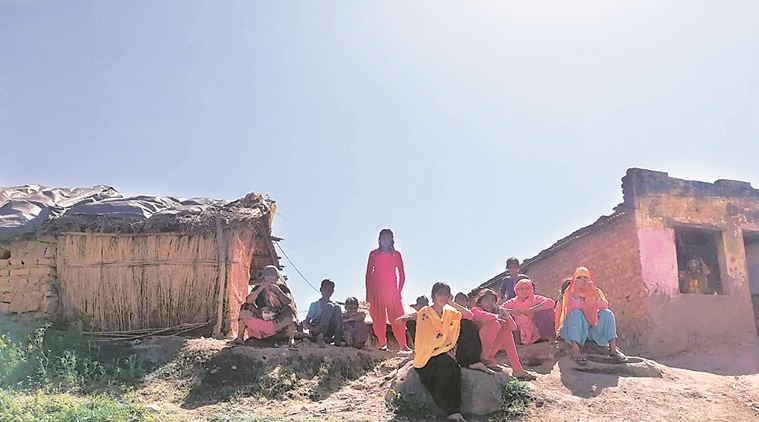 A group of women in Burj Kotia village, Panchkula. (Photo by Pallavi Singhal)
A group of women in Burj Kotia village, Panchkula. (Photo by Pallavi Singhal)
IN BURJ Kotia, a small village in Panchkula, lies a pocket of almost 80 migrants, who had moved in search of work and stayed. They don’t know much about the current global pandemic. All they understand of it is hunger and neglect.
These people, hailing from Uttar Pradesh’s town Aligarh, used to work as daily wage earners and have nothing to their name. They live on borrowed land under temporary huts. With the industries shut and ration running short, they live in constant fear of having nothing to eat very soon.
“We have run out of almost all supplies and are only living on roti. I have my wife and a small boy, both of who do not understand what is happening,” said 30-year-old Bhola, who had come to the village with his father almost 15 years back. While his father left to become a farmer at his own village, Bhola stayed back to work.
Like a number of villages of the district, Burj Kotia, falling under Chandimandir area, is lined with screening plants that have now been shut for more than two weeks. While the administration, NGOs, and other help groups have ensured that food reaches slum areas inside the city, there are several such pockets like Burj Kotia which feel abandoned.
“We have nothing to eat. We are hand to mouth workers and the day our bosses told us to stop coming, was the day we earned our last penny. We have nothing now and are only eating rotis with chutney or salt,” said 64-year-old Sita Devi.
The residents complain that not even a single person has visited them. “Gian Chand Gupta came when the elections were on head along with a huge cavalry and made tall promises. Nobody has come since.
We do not have electricity connections, no food, our employers have denied paying us, and our children run around hungry. The policemen who do visit only tell us that we have to stay far away from each other and cover our mouths. They know we exist, but they do not know how to help,” groused 26-year-old Raj Kumar.
Asked about the precautions they were taking for the coronavirus, a group of women goes silent. “It is the disease of the rich. Nobody here has traveled from outside. We do not need to worry,” said one. With no access to basic necessities like water or electricity, regular hand washing also seems impossible to them. “We go on foot to fetch water from nearby hand pumps or the Ghaggar river that flows at the back.
We use it to cook and drink. We cannot really wash our hands every half hour. We don’t even have so much soap,” they say.
This is the first time Seema (18), has been idle. “I earlier used to get vegetables and chop them and cook them and ready my brothers for school and fetch water but now, nobody is allowed to do anything. So I just sit and talk to my friends,” she said.
Sub-Inspector Raj Kumar, posted right next to the pocket, sits on a check post allowing or denying entry into the village. “We know things are difficult right now, but they can always approach the administration.
We will suggest they meet with the Deputy Commissioner and seek help.”
The village is 15 km away from the building that houses the DC’s office.